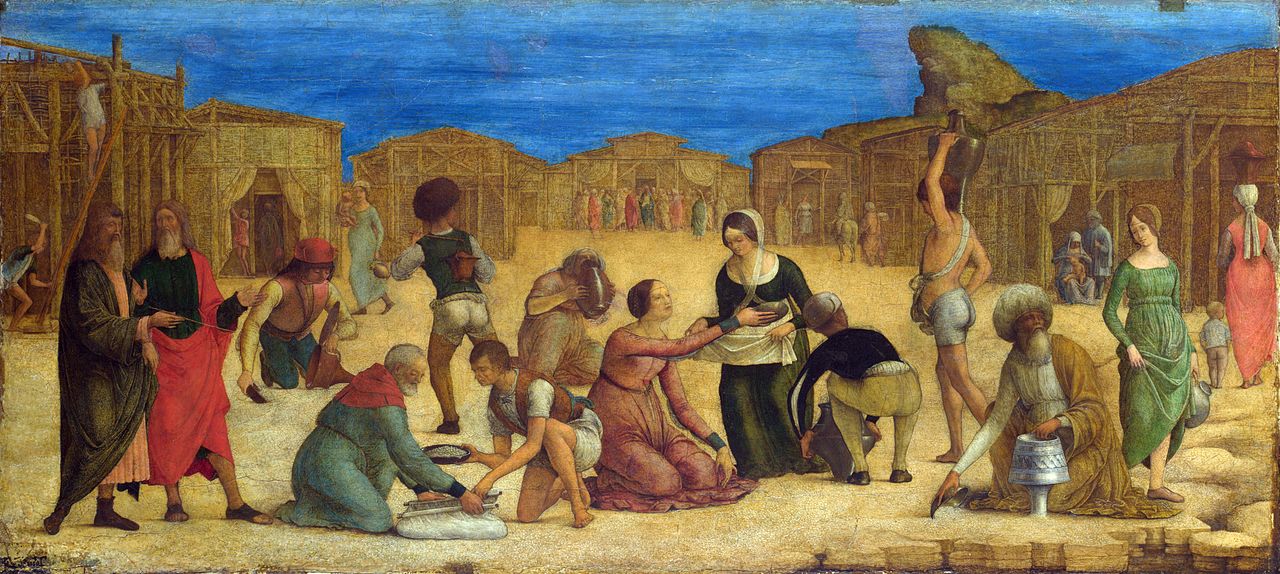Epilogue to the Manna Story/1/he
האפילוג לפרשת המן
הקדמה

הרחבת מסגרת הזמן
רובו של שמות ט"ז מכיל רישום של האירועים המפליאים אשר קרו בשבוע הראשון של נס המן: המן יורד מהשמיים בימי חול רגילים, ביום שישי יורדת מנה כפולה, ובשבת המן נעדר לחלוטין. עם זאת, בסיום הפרק הדיון עובר להתעסק באירועים הרלוונטיים רק לעתיד הרחוק יותר:
רוב שמות ט"ז provides a log of the amazing events of the first week of the miracle of the manna: its raining down from the heavens on regular weekdays, the double portion of manna collected on Fridays, and its complete absence on Shabbat. The conclusion of the chapter, though, moves on to discuss events relevant only for the more distant future:
(לב) וַיֹּאמֶר מֹשֶׁה זֶה הַדָּבָר אֲשֶׁר צִוָּה י"י מְלֹא הָעֹמֶר מִמֶּנּוּ לְמִשְׁמֶרֶת לְדֹרֹתֵיכֶם לְמַעַן יִרְאוּ אֶת הַלֶּחֶם אֲשֶׁר הֶאֱכַלְתִּי אֶתְכֶם בַּמִּדְבָּר בְּהוֹצִיאִי אֶתְכֶם מֵאֶרֶץ מִצְרָיִם. (לג) וַיֹּאמֶר מֹשֶׁה אֶל אַהֲרֹן קַח צִנְצֶנֶת אַחַת וְתֶן שָׁמָּה מְלֹא הָעֹמֶר מָן וְהַנַּח אֹתוֹ לִפְנֵי י"י לְמִשְׁמֶרֶת לְדֹרֹתֵיכֶם. (לד) כַּאֲשֶׁר צִוָּה י"י אֶל מֹשֶׁה וַיַּנִּיחֵהוּ אַהֲרֹן לִפְנֵי הָעֵדֻת לְמִשְׁמָרֶת. (לה) וּבְנֵי יִשְׂרָאֵל אָכְלוּ אֶת הַמָּן אַרְבָּעִים שָׁנָה עַד בֹּאָם אֶל אֶרֶץ נוֹשָׁבֶת אֶת הַמָּן אָכְלוּ עַד בֹּאָם אֶל קְצֵה אֶרֶץ כְּנָעַן.
When did these events take place, and at what point were these verses recorded?
מתי התרחשו אירועים אלה, ובאיזה שלב הפסוקים הללו נאמרו?
הפסקת ירידת המן
פסוק ל"ה המספר על ארבעים השנים שבהן נמשך נס המן הוא הדוגמה הקלאסית המשמשת להוכחה שהתורה לפעמים מצרפת מידע שהתרחש רק באופן משמעותי בזמן מאוחר יותר, כל זאת על מנת להשלים סיפור.1 באופן מעניין, נדמה שפסוק זה אף מתייחס לאירועים החורגים משנת הארבעים, שכן הוא מדבר על אכילת המן עד הגעת האומה ל"אֶרֶץ נוֹשָׁבֶת" ול"קְצֵה אֶרֶץ כְּנָעַן". מה הקשר בין שני הביטויים האלו; האם שניהם מתייחסים לאזור שבערבות מואב (ממזרח לירדן), או אולי דווקא לישראל, או שמא כל אחד מהם מדבר על עברו האחר של הנהר? אם םירוש המונחים זהה, מדוע הכפילות הזו? אם לא, אזי נשאלת השאלה מתי בדיוק הפסיק המן לרדת? האם התורה מדברת כאן רק על אירועים שהתרחשו במהלך חייו של משה, או גם על אירועים שקורים לאחר מותו של משה ומעבר הירדן?
פסוק ל"ה and its description of the forty year duration of the miracle of the manna is the classic example used to prove that the Torah sometimes appends information which happened only significantly later so as to complete a story.2 Interestingly, this verse might even refer to events which go beyond the fortieth year, as it speaks of eating the manna until the nation's arrival at both "אֶרֶץ נוֹשָׁבֶת" ו"קְצֵה אֶרֶץ כְּנָעַן". What is the relationship between these two terms; do they both refer to the land of Arvot Moav (east of the Jordan), both to Israel proper, or do they split between the two? If the terms mean the same thing, why the doubling? If not, when exactly did the manna cease? Is the Torah speaking here only about events which took place in Moshe's lifetime, or also about those which happened after Moshe's death and the crossing of the Jordan?
המן למשמרת
It appears that at least part of פסוקים ל"ב-ל"ד is also out of chronological order. פסוק ל"ד speaks of Aharon's preserving of an omer of manna by storing a jar of it "לִפְנֵי הָעֵדֻת", a term used in the Torah3 to describe the place of "אֲרוֹן הָעֵדֻת" ו"לֻחֹת הָעֵדֻת" contained therein. At this point, however, the Tabernacle and Ark had not yet been built, seemingly placing this event no earlier than the second year.4 Here, too, though, the extent of the achronology is unclear:
- Did this occur immediately after the construction of the Mishkan, or only at some later point? When would have been the most logical time to have set aside the manna – when the phenomenon first began, when there was a proper place for safe-keeping, or perhaps only on the eve of the nation's entry into the land, when it became necessary to commemorate the soon to be ending miracle?
- Are Moshe's instructions בפסוקים ל"ב-ל"ג communicated at the same time as their fulfillment בפסוק ל"ד?
- Moshe's directive speaks of placing the manna "לִפְנֵי ה'". Does that term have an identical meaning to "לִפְנֵי הָעֵדֻת" and speak of the same event? Or is it possible that the terms have distinct meanings and that the manna was placed in different places at different times (one of which might even have perhaps preceded the Tabernacle's construction)?
מתי נכתב הנספח לפרק?
In addition to the questions regarding when the events occurred, we must also consider the question of when the verses of the epilogue were recorded. Did Moshe, in the first year, prophetically write the entire chapter including its appendix even before some of these events transpired, or did he write about these events only after the fact?5 Was Moshe, already in the first year, privy to the information that the Children of Israel would spend forty years wandering in the wilderness because of the Sin of the Spies? אם פסוק ל"ה describes events that took place after the crossing of the Jordan, does that suggest that Moshe wrote also about events that took place after his death?